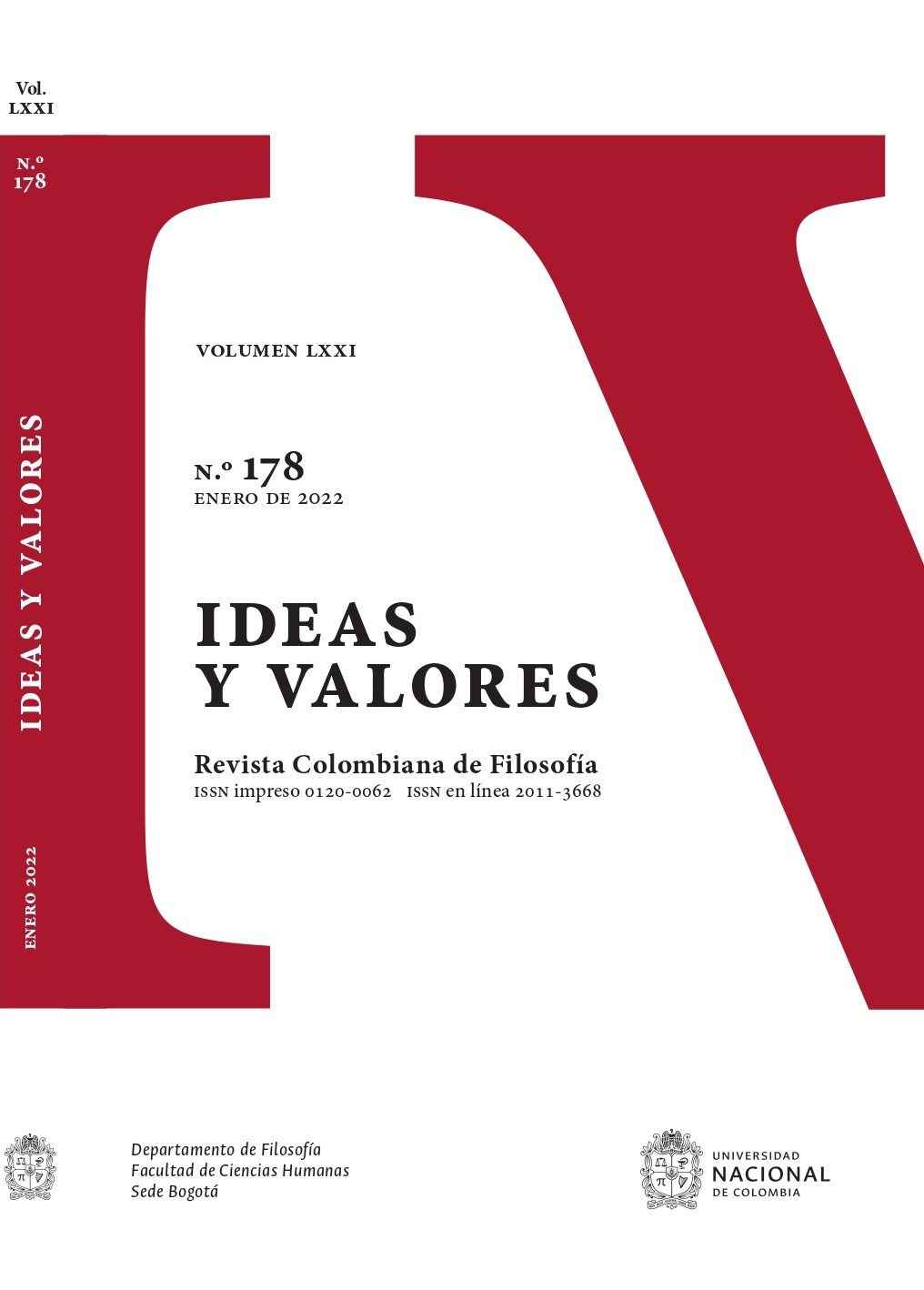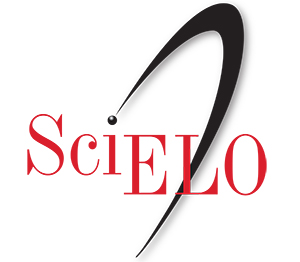Metáforas conceptuales en la filosofía académica panameña
Conceptual Metaphors in the Panamanian Academic Philosophy
DOI:
https://doi.org/10.15446/ideasyvalores.v71n178.81898Keywords:
Esencialismo, Filosofía panameña, Ideología, Metáforas conceptuales (es)Essentialism, Panamanian philosophy, Ideology, Conceptual metaphors (en)
Downloads
Este trabajo tiene como objetivo principal examinar y determinar las consecuencias de las metáforas contenidas en las obras de Diego Domínguez Caballero, fundador de la filosofía académica panameña. Tales metáforas se convirtieron en fundamentales para el desarrollo discursivo de la filosofía panameña, y también para las ciencias sociales en Panamá, como la historia y la sociología. Con este fin, recurriremos a la teoría de las metáforas conceptuales desarrollada por Lakoff y otros como una herramienta de ayuda para analizar tales metáforas. Del mismo modo, intentamos dar cuenta de la larga incidencia discursiva de dichas metáforas a la luz de los resultados de la investigación psicológica sobre el esencialismo.
References
Adler, A. The neurotic constitution; outlines of a comparative individualistic psychology and psychotherapy. New York: Moffat, Yard and Company, 1917. DOI: https://doi.org/10.1037/10671-000
Adler, A. “Salvaging mankind by psychology.” The Collected Clinical Works of Alfred Adler: Journal articles: 1921-1926. The classical adlerian translation project. usa: The Classical Adlerian Translation Project, 2004. 92-95.
Allard, B. “Ricaurte Soler y la reinvención de una tradición.” Tareas 127 (2007): 131-138.
Aristóteles. Poética de Aristóteles. Madrid: Editorial Gredos, 1974.
Bloom, P. Descartes’ Baby: How the Science of Child Development Explains What Makes Us Human. New York: Basic Books, 2009.
Danesi, M. Poetic Logic: The Role of Metaphor in Thought, Language, and Culture. usa: Atwood Publishing, 2004.
Davidson, D. “Qué significan las metáforas.” De la verdad y de la interpretación. Barcelona: Editorial Gedisa, 2001.
Domínguez Caballero, D. “Servicio a la Universidad de Panamá.” Revista Lotería 263. Panamá: Lotería Nacional de Beneficencia, 1978.
Domínguez Caballero, D. Motivo y sentido de una investigación de lo panameño. México: unam, 1979.
Domínguez Caballero, D. Razón y sentido de lo panameño. Panamá: Eupan, 2004.
Gelman, S. The Essential Child: Origins of Essentialism in Everyday Thought. Oxford: Oxford University Press, 2003. DOI: https://doi.org/10.1093/acprof:oso/9780195154061.001.0001
Gelman, S. y Wellman, H. “Insides and Essences: Early understanding of the non-obvious.” Concepts: core readings. Eds. Eric Margolis y Stephen Laurence. Cambridge, Mass.: mit Press, 1999. 613-638.
Hood, B. SuperSense. Why we believe the unbelievable. New York: Harper One, 2009. Kövecses, Z. Metaphor: A Practical Introduction. (2.a ed.). New York: Oxford University Press, 2010.
Lakoff, G. Women, fire, and dangerous things. Chicago: The University of Chicago Press, 1987. DOI: https://doi.org/10.7208/chicago/9780226471013.001.0001
Lakoff, G. “Metaphor and war: the metaphor system used to justify war in the gulf.” Peace Research 23.2/3 (1991): 25-32.
Lakoff, G. “Metaphor, Morality, and Politics, Or, Why Conservatives Have Left Liberals in the Dust.” Social Research 62.2 (1995): 177-214.
Lakoff, G. y Johnson, M. Metaphors we live by. Chicago: Chicago University Press, 1980.
Lakoff, G. y Johnson, M. Philosophy in the flesh. The embodied mind and its challenge to Western thought. New York: Basic Books, 1999.
Lakoff, G. y Núñez, R. Where Mathematics Comes From: How the Embodied Mind Brings Mathematics into Being. New York: Basic Books, 2000.
Méndez Pereira, O. “Panamá, país y nación de tránsito.” Tareas 135 (2010): 71-78.
Miró Quesada, F. Impacto de la metafísica en la ideología latinoamericana. México: unam, 1978.
Miró Quesada, F. “Historicism and Universalism in Philosophy.” Cultural Relativism and Philosophy: North and Latin American Perspectives. Ed. Marcelo Dascal. Leiden: E. J. Brill, 1991. 143-158. DOI: https://doi.org/10.1163/9789004451612_011
Moreno Davis, J. C. Historia espíritu y autenticidad de la filosofía en Panamá y panameña. Panamá: iden, 2006.
Nietzsche, F. “Sobre verdad y mentira en sentido extramoral.” En Nietzsche i. Madrid: Editorial Gredos, 2009. 187-201.
Phillips, W., Shankar, M. y Santos, L. “Essentialism in the absence of language? Evidence from rhesus monkeys (Macaca mulatta).” Developmental Science 13 (2010): f1- f7. DOI: https://doi.org/10.1111/j.1467-7687.2010.00982.x
Pizzurno, P. “Los escenarios y las agendas del 9 de enero de 1964.” Revista Cultural Lotería. Edición especial, 2014. 9-27.
Prentice, D. y Miller, D. “Psychological Essentialism of Human Categories.” Current Directions in Psychological Science 16.4 (2007): 202-206. DOI: https://doi.org/10.1111/j.1467-8721.2007.00504.x
Rorty, R. Objectivity, relativism, and truth. Cambridge: Cambridge University Press, 1991. DOI: https://doi.org/10.1017/CBO9781139173643
Rorty, R. Philosophy and Social Hope. London: Penguin Books, 1999.
Sawchuk, K. “Wounded States: Sovereignty, separation and the Quebec referendum.” Pain Strikes. Eds. Bill Burns, Cathy Busby y Kim Sawchuk. Minneapolis: University of Minnesota Press, 1999. 96-115.
Soler, R. Pensamiento panameño y concepción de la nacionalidad durante el siglo xix. Panamá: Librería Cultural Panameña, 1971.
Vico. The new science of Giambattista Vico. New York: Cornell University Press, 1948.
How to Cite
MODERN-LANGUAGE-ASSOCIATION
ACM
ACS
APA
ABNT
Chicago
Harvard
IEEE
Turabian
Vancouver
Download Citation
License
Copyright (c) 2021 Los derechos son del autor(es), quien(es) puede re-publicar en parte o en su totalidad el documento ya publicado en la revista siempre y cuando se dé el debido reconocimiento a Ideas y Valores

This work is licensed under a Creative Commons Attribution-NonCommercial-NoDerivatives 4.0 International License.
The Creative Commons Attribution-NonComnercial-No Derivatives 4.0 Internacional License authorizes copying and redistributing the material in any means or format, provided that credit is granted to the authors and to Ideas y Valores as the source of the original publication. Copying or distributing the contents of the journal for commercial purposes is not allowed; neither is the adaptation, derivation, or transformation of the contents, without previous authorization by the authors and the editors of Ideas y Valores. For further information regarding the terms of this license, please consult http://creativecommons.org/licenses/by-nc-nd/4.0/legalcode.







1.jpg)
.png)


1.png)
.png)
.png)
.jpg)

.png)









